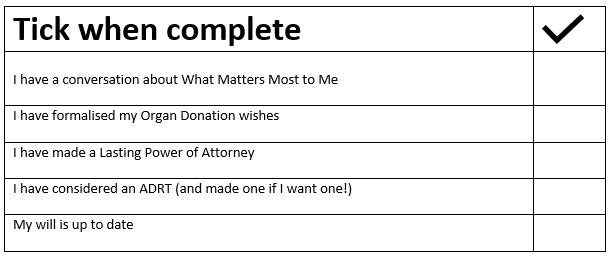Your Advance Care Planning: a five-step resolution for 2024
Looking to 2024 and the resolutions that are so popular this time of year, now seems a good time to suggest Advance Care Planning as a resolution with real meaning. It can seem a daunting task and will be different for everyone depending on your stage of life, but there are some common themes and ideas that can work for us all. This blog offers five practical tasks, listed below, for Advance care Planning.
1. Have a conversation with the people closest to you about what matters most to you
2. Formalise your wishes regarding Organ Donation
3. Complete your Lasting Power of Attorney
4. Consider an Advance Decision to Refuse Treatment
5. Create or update your will
Have a conversation with the people closes to you about what matters most to you
Advance Care Planning begins with sharing What Matters Most to You with the people closest to you. It doesn’t have to be a heavy conversation, and can be sparked by watching a film or following a story in the news.
Formalise your wishes regarding Organ Donation
In England we have an opt out system for Organ Donation , this means that all adults are now considered to have agreed to be an organ donor when they die unless they have documented a decision not to donate or are in an excluded group.
https://www.organdonation.nhs.uk/helping-you-to-decide/about-organ-donation/consent/
Complete your Lasting Power of Attorney
A Lasting Power of Attorney is an important legal document that enables you to nominate a person or people to speak for you if you lose capacity to make decisions. You can find out more about making a Lasting Power of attorney in previous blogs I have written[i][ii][iii][iv][v]
Too many people think that their next of kin has final say in medical decisions or that if a couple have a joint bank account and one of them loses capacity to make financial decisions, the other can make decisions for them both; neither is true.
Capacity can be lost through a sudden accident or ill health as well as a longer-term health condition like dementia, having a Lasting Power of Attorney in place means the people you trust the most can make the decisions that matter the most.
Consider an Advance Decision to Refuse Treatment
An Advance Decision to Refuse Treatment (ADRT) enables you to refuse a specific treatment in a specific circumstance, even if this was a life sustaining treatment. I’m including ADRTs in the tasks because many people know there are some “hard lines” they would not want crossed and feel very passionately about this.
If you have a strong opinion on what you would not wish to happen, then it is important to document this in an ADRT. if you are happy for all healthcare decisions to be left to your attorneys (if you have a Lasting Power of Attorney (with Option A)), or to medical teams (if you don’t have a Lasting Power of Attorney), then you don’t need an ADRT. Either way, take a moment to learn more about ADRTs and make a decision that is right for you.
Find out more about Advance Decision to Refuse Treatment:
Blog: Making my Advance Decision to Refuse Treatment
Podcast: Advance Decision to Refuse Treatment with Celia Kitzinger
Create or update your will
You don’t need me to tell you how important having a will is, but…. have you made yours? If the answer is yes, is it up to date? Circumstances change, life changes and this it might mean that your will should be updated.
If you do have a will, does it include how any digital assets might be managed – for example if you have a website and wish it to continue in the event of your death, have you made provision for this? I have a super conversation about How to start your Digital Legacy with James Norris and you can access resources for your Digital Legacy in the show notes of the episode.
Closing thoughts
Breaking Advance Care Planning into themes and tasks transforms it from a nebulous concept to real actions. I hope there is at least one takeaway for everyone reading this blog and would love to hear any steps taken as a result. You may find the blog valuable for yourself or as a conversation starter with someone close to you and feel free to take a picture of the list below and add it to your 2024 to dos.
Find out how I can support you in making a personalised Advance Care Plan or a Lasting Power of Attorney
With all good wishes for a peaceful, happy and successful 2024, Clare
To feature your question about Advance Care Planning contact me
If the blog has helped you or provided information and you would like to support my ongoing work, head to Buy me a coffee – thank you!
[i] “Is it necessary for me to have a Lasting Power of Attorney as I am fit and health and I have capacity. My wife and daughter are my next of kin and would speak for me……wouldn’t they?”
[ii] How do I make a Lasting Power of Attorney?
[iii] Why do I need a Lasting Power of Attorney asks Lee?
[iv] How much does it cost to make a Lasting Power of Attorney? For Jake
[v] Lasting Power of Attorney: This time it’s personal



